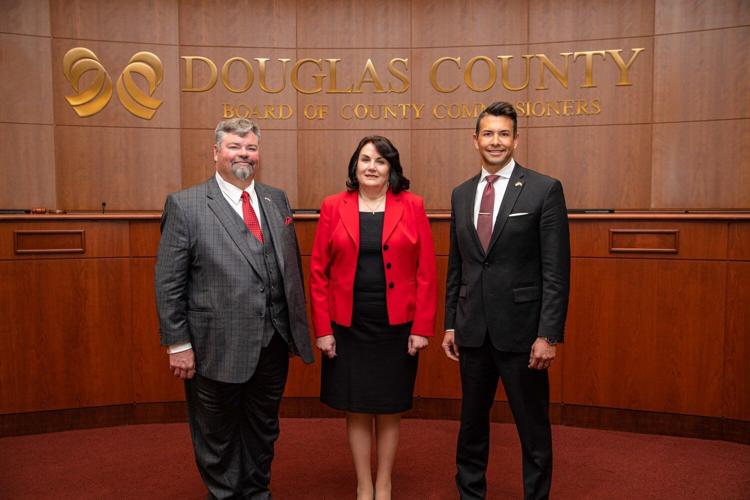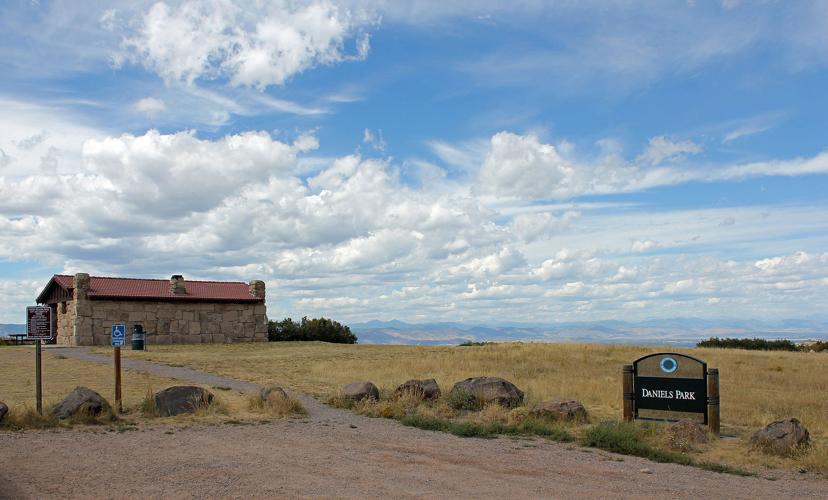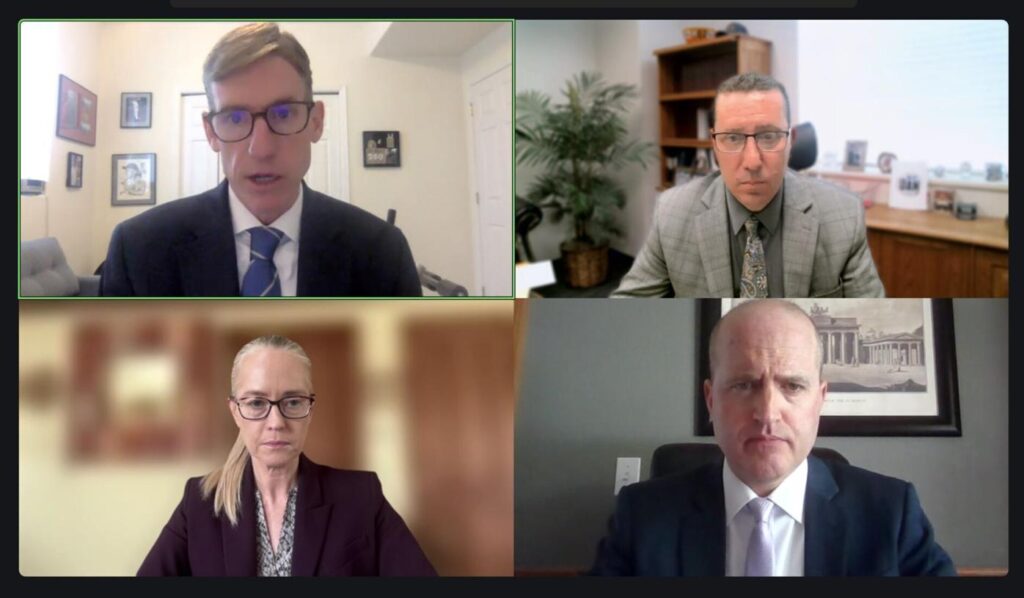Douglas County wants a water commission, but water providers are skeptical
Editor’s note: This report is the first a series looking into the fight over how best to plan for and secure sustainable water in Douglas County.
Does Douglas County, a fast-growing suburb in between Denver and Colorado Springs, needs its own water commission?
Yes, according to Commissioner Abe Laydon, who, along with fellow Commissioner George Teal, voted to start the process of setting up one. Commissioner Lora Thomas, on the other hand, opposed the idea.
Like other local jurisdictions in Colorado and elsewhere in the west, Douglas County — with its 370,000 residents, and growing — is eager to ensure it can sustainably secure and deliver water over the next several decades. But the idea of a water commission has been met by skepticism and fears it would hamper, rather than help, the county. Many also asked what, exactly, it hopes to achieve that existing entities aren’t already working on.
Laydon told Colorado Politics that Douglas County residents are asking for a water plan, although he didn’t say they sought a commission.
“We have a lot of wonderful regional partnerships” around water, he said.
And Laydon countered that setting up a county-wide water plan is not an “either or” proposition. He pointed to large counties, such as El Paso, which have formed their own water master plans.
A major difference exists between El Paso County and the process envisioned by Laydon for his county. El Paso’s 2018 master plan was created by the county, using a third-party consultant and under the county’s planning and community development department, not via a water commission.
Laydon envisioned asking for participation from the county’s water providers, which will then submit names for a technical advisory committee.
Already, about a dozen water providers either submitted names for the technical group or sent questions about what the commission would exactly do, and some did both.
A May 10 letter to the county’s water providers said the proposed commission would work with water providers to “ensure an adequate water supply in terms of quantity, quality and dependability” for existing and future development; engage in public outreach and education; promote cooperation and partnerships among county water plan participants; understand long-term supply needs and potential water supply gaps; and, identify opportunities for efficiencies or conservation measures.
The concept, Laydon said, is to have a water commission similar to the Douglas County’s planning commission. Individuals would apply to serve on the water commission, which will then be charged with coming up with a comprehensive water plan to carry the county to 2050.
The county’s commissioners would have the final say on who sits on the water commission.
Laydon said he envisions the county’s water plan would be integrated with other water plans from providers, such as from Castle Rock, Parker and from the Southwest Metro Water Supply Authority, a coalition of 14 water providers in Douglas and Arapahoe counties.
He pointed out that Southwest Metro’s plan, for example, doesn’t cover unincorporated areas of Douglas County, leaving a gap.
“For us to have a long range vision, it would be irresponsible of us not to have a plan for Douglas County,” Laydon said.
Laydon said he doesn’t favor putting a water plan into the hands of the county’s planning commission because he said they aren’t water experts.
“I don’t want bias, I don’t want influence, I don’t want special interests. I want a very clear objective plan, which our citizens have been asking for — for 15 years.”
He also believes the commission and the water plan can be done within existing resources.
But there will be costs.
For example, the state water plan, which has been in place since 2015 and updated since then, estimated a state-only cost for the various projects identified in the plan at $3 billion over 30 years.
Laydon said the county has a strong history of being fiscally conservative but added it’s also the wealthiest county in America outside of the Washington, D.C. metro area and the counties in and around San Francisco. (Forbes’ most recent rating placed Douglas County ninth, mostly behind counties in those areas and based on average income). The county, for example, has no debt and runs on a balanced budget, Laydon pointed out.
“I’m excited to see what the commission comes up with,” he said. “The charge will be fiscally sound and clear about who’s paying for what.”
He also promises that the process will be transparent.
Teal agrees with the concept, telling Newsbreak earlier this year that there should be a county-wide approach to water issues.
“I don’t think we can say we have planned for all of Douglas County now,” he said. “You have Castle Rock, Parker and all the other (municipalities) and they’re all trying to score a touchdown with their own footballs.”
Water providers worry
While Laydon is cheerleading for a water commission and a plan, providers in the county appear to be skeptical, both about the commission’s purpose and what it hopes to achieve.
The South Metro Water Supply Authority pointed out many Douglas County water providers already have a master or integrated resource plan in place that incorporates water supply development infrastructure, reuse and conservation programs. SMWSA plans by year’s end to update its 2016 water master plan that includes both its members and the constituents who don’t get water or wastewater provider services.
“Prior to agreeing to serve on the [technical advisory group], members are inquiring about the composition of the commission and how the anticipated outcome or final product of the commission’s work will differ from work already underway by the authority and its members,” wrote Lisa Darling, South Metro’s executive director.
She added that members fear the commission’s work will be duplicative of ongoing efforts, or could result in unnecessary regulatory oversight that could obstruct programs being planned or already established.
Castle Rock Water’s Mark Marlowe, while wanting to be included in the technical advisory group, also has a lot of questions about just how the commission will be construed.
“Since water policy is a highly technical and complex subject, Castle Rock Water is very interested in what the qualifications of commission members will be. This is especially important to consider” if commissioners will make decisions around those unincorporated parts of the county not currently served by water providers, Marlowe wrote.
Castle Rock Water, one of the three largest in the county, also suggested the county hire a professional to help the commission with developing the plan, and also asked if the county commission had come up with a budget, pointing out that its experience in water planning “has helped inform the complexity and cost of developing these types of plans.” Castle Rock Water also pointed out the county did not have a water department or professionals with water backgrounds, and asked about how the water commission would interact with the county commission, including over matters of authority.
In addition, most of the county’s water providers have water plans, and Marlowe asked how would the county’s water plan interact with those other plans.
“This is an important consideration, given the amount of investment that individual water providers and SMWSA have made toward long-term water,” he wrote.
“This is not a ‘one and done'” kind of project, Marlowe added. Any long-term water planning requires updating and monitoring of progress and implementation, he said.
Centennial Water, another of the county’s three largest providers, agreed with the points raised by Castle Rock but added more questions.
“What’s the problem the commission is trying to solve?” wrote Sam Calkins, the district’s general manager.
He added: How will it be different from what SMWSA is already doing? Who’s writing the plan, the technical group or the county staff?
Notably, the county’s other large provider, Parker Water, has not submitted either a name for the technical group nor any comments on the water commission.
Thomas, the commissioner, still has a lot of questions about what the water commission would do. She said a county-wide water plan is unnecessary, and noted that the questions raised by Castle Rock and SMWSA have not yet been answered. Most recently, she said staff was tasked with setting up a process for appointing the water commission’s members.
“I’m not sure what this water commission is going to do,” she told Colorado Politics.
Then there’s the cost. Thomas said it would cost money, contrary to Laydon’s claim.
“How are we going to have water consultants do a water plan for 2050 if we’re not going to spend any money?” she said.













